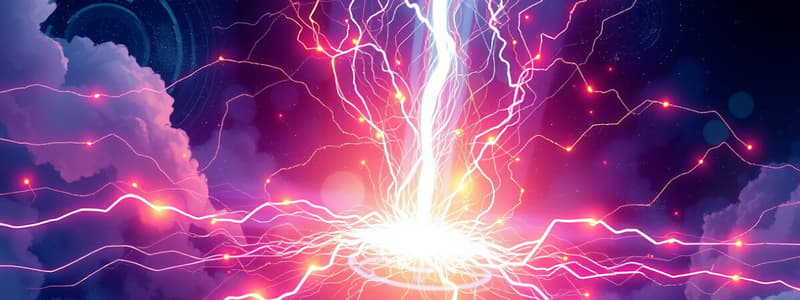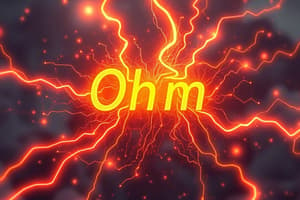Podcast
Questions and Answers
What is the SI unit of measure for electrical resistance?
What is the SI unit of measure for electrical resistance?
Ohm
What is the unit of measure for current?
What is the unit of measure for current?
Ampere
What is the SI unit of energy?
What is the SI unit of energy?
Joule
What is the SI unit of power?
What is the SI unit of power?
What is the SI unit of capacitance?
What is the SI unit of capacitance?
What is the SI unit of electric charge?
What is the SI unit of electric charge?
One ____ produces a current of 1 ampere through a resistance of 1 ohm.
One ____ produces a current of 1 ampere through a resistance of 1 ohm.
What is voltage?
What is voltage?
What is current?
What is current?
What is resistance?
What is resistance?
What is a circuit?
What is a circuit?
Electrons are involved in __________.
Electrons are involved in __________.
A property of an elementary particle that determines the strength of its electric force with other particles that also have ______.
A property of an elementary particle that determines the strength of its electric force with other particles that also have ______.
What is a conductor?
What is a conductor?
What is an insulator?
What is an insulator?
What is the inverse square relationship?
What is the inverse square relationship?
What is an electric field?
What is an electric field?
What is electric potential energy?
What is electric potential energy?
Electric potential is also known as ________.
Electric potential is also known as ________.
What is the SI unit of electric current?
What is the SI unit of electric current?
What is Ohm's Law?
What is Ohm's Law?
What is power in electric circuits?
What is power in electric circuits?
Plasma is an ionized gas that can conduct electricity. Energy is required to produce a ______.
Plasma is an ionized gas that can conduct electricity. Energy is required to produce a ______.
Capacitance is also a measure of the amount of electric potential energy stored (or separated) for a given electric potential. ____________.
Capacitance is also a measure of the amount of electric potential energy stored (or separated) for a given electric potential. ____________.
Flashcards are hidden until you start studying
Study Notes
Electrical Units and Concepts
- Ohm: SI unit for electrical resistance, where 1 ohm allows a current of 1 ampere with a potential difference of 1 volt.
- Ampere (Amp): Unit measure for electric current; describes the flow rate of electric charge.
- Joule: SI unit of energy; equivalent to 1 newton acting over a distance of 1 meter.
- Watt: SI unit of power, defined as 1 joule per second.
- Farad: The SI unit of capacitance, measuring a capacitor's ability to store charge.
- Coulomb: SI unit of electric charge; represents the charge carried by 1 ampere over 1 second, or approximately 6.24 x 10^18 protons.
- Volt: SI unit of electric potential, defined as joules per coulomb (J/C); relates to current and resistance through Ohm’s Law.
- Voltage: The potential difference expressed in volts, driving current through a circuit.
Current and Resistance
- Current: Flow of electric charge over time, measured in amperes, representing the amount passing through a point in one second.
- Resistance: Impedance to electric current flow, measured in ohms; it is calculated as voltage divided by current (R = V/I).
Circuits and Electricity
- Circuit: Complete path allowing electricity to flow continuously.
- Electricity: Phenomena tied to electromagnetic force, primarily involving electron movement.
- Charge: Property of elementary particles that defines electric force interaction, quantified in coulombs.
Conductors and Insulators
- Conductor: Material (like metals) that permits the easy flow of electricity.
- Insulator: Material (like ceramics) that resists the flow of electricity.
Relationships and Fields
- Inverse Square Relationship: Quantity inversely proportionate to the square of another, such as gravitational and electrical forces based on distance.
- Electric Field: Space around a charged object indicated by the force experienced per unit charge, measured in newtons per coulomb (E = F/q).
Potential Energy and Voltage
- Electric Potential Energy: Work needed to move a charge within an electric field, measured in joules.
- Electric Potential: Also known as voltage, defined as electric potential energy per unit charge (V = EPE/q).
Additional Definitions
- Ampere: Current unit defined as 1 coulomb per second; related to magnetic force between parallel wires.
- Ohm's Law: Principle stating resistance equals voltage divided by current (R = V/I).
- Power: Rate of energy conversion, measured in watts or joules per second; calculated by multiplying current and voltage (P = IV).
Unique States of Matter
- Plasma: Fourth state of matter where atoms lose electrons, forming an ionized gas capable of conducting electricity; energy is required for its creation.
- Capacitance: Ability to store electric potential energy in a field; indicates how much energy a capacitor can store based on voltage.
Studying That Suits You
Use AI to generate personalized quizzes and flashcards to suit your learning preferences.




